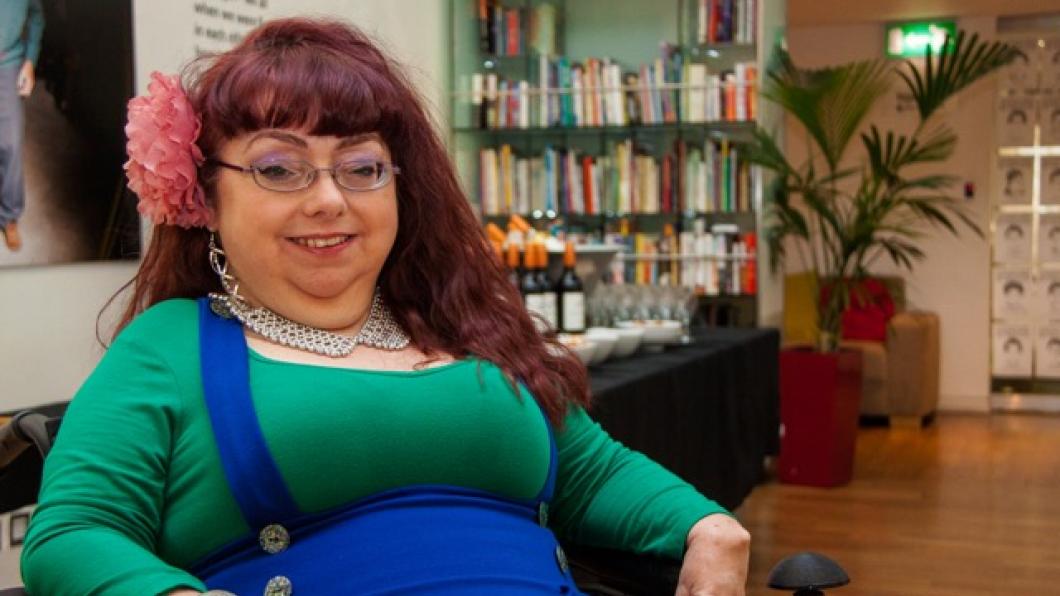
Austerity cuts threaten to silence British writer
By Penny Pepper
From humble beginnings on a council estate, bereaved of my father aged seven, battling a personal fight with the pain of juvenile arthritis and the bigger war against a discriminating society—I now find myself at a threshold.
My memoir First in the World Somewhere is launched on the crowd funding publisher Unbound and will later go into the shops via Penguin Random House.
The memoir details my fight to break free from the constraints of an unhappy home, but also celebrates the wild adventures of my time as a singer songwriter, pushing my way into the vibrant scene of the mid '80s onwards, into crazy connections with music makers and writers and ending with my second marriage to an eccentric archaeologist in 1999.
This is my passion: to tell the story. Having reached a certain level of success as a writer, poet and performer I feel comfortable to tell my own tale.
One reason I feel the memoir has been taken up is that these stories have not been told. Not so much stories about personal experience of impairment, but stories where we confront the barriers that constrain us, forcing us to exist in a shadowland.
It’s ironic this comes against the backdrop of Britain’s most severe government attacks on disabled people in many years. They say we are all in it together, they say everyone has to feel the pinch. But as disabled people do not have equality in the first place, the cuts made are truly unkind and immoral.
One of the worst has been the closure in June 2015 of the Independent Living Fund (ILF). I paid for care workers from the ILF and the closure is terrifying, after 27 years of supporting severely disabled people like myself to live in their own homes.
The government clearly lied as, day by day, accounts are collected which highlight the lack of provision and evaporation of the so called “transition money”—through which local authorities were to take over the funding.
A close friend who I’m advocating for has had a 48 per cent cut in his social care as a result. For example, this translates into “no food or drink for five hours during the day.” It’s been suggested that his personal assistant do his weekly shopping in one hour. My own review will happen in March—I have no idea of the outcome.
As a writer/performer, like anyone in a similar position, I grasp all opportunities. But every one of them is reliant on my care support—and let’s be plain, I’m frightened. Never mind the work I love, this support starts the moment I wake up, when my care worker Emma helps me out of bed, to use the toilet, to have breakfast, get dressed and so on.
I was on ILF from 1998 when my first marriage ended. Before that, my husband did the bulk of my care.It worked for a while but when we split up, ILF allowed me to remain fully supported at home.
This was the true beginning of my adult life. A rebirth, underpinned by my new understanding of disability activism, and my involvement in disability arts. ILF, through the care workers it paid for, under my control, to match my needs and life-style, was a revelation.I had the same three people helping me wash and dress; the choice to change my mind in what I wore, what I ate, in when I got up – and the freedom to go to the toilet when I needed.It’s impossible to overstate the effect of this liberation.
I left the parental home at 25—after a struggle—to live with my best friend Kate, who was also disabled. We had six hours a week home-help to share. How did we prioritize our care? Having a hair wash often came above eating. We were often ill and never went out without immense logistical planning.
Fast forward to 2015. Disabled people fought for a lot and we won’t give up on what we’ve achieved, refusing to lose those services which gave us a semblance of equality. Attitudes remain variable, the right wing tabloid press loves a good story about a disabled “scrounger,” and it also loves a spread on a Paralympian. Disability hate crime is up 70 per cent —and I’ve certainly experienced that on the streets of London.
But outside statistics, starting from disabled communities themselves, there is a strong growing connection to the mainstream anti-austerity protest and a realization that impairment does not only equate to a wheelchair. There are sensory impairments, learning difficulties, long-term health conditions and mental health problems. All face the attacks of austerity differently, but with similarly frightening outcomes—a cut in support or benefits.
As for me, I have to pitch to get pledges for First in the World Somewhere, to bring it out into the world with its message, told through the tales of my rascally goings on, of highs, of lows, marriage, divorce, music and words. Always words. Reminding the world disabled people are part of the broad experience of the human condition. We have a right to be, and a right to tell our tales.
Read about Penny Pepper and the current tour of her one-woman show at http://www.pennypepper.co.uk. Photo by Elixabete Lopez.